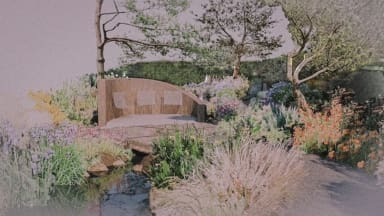
Supported by Project Giving Back, the garden has been designed by Miria Harris. Harris, previously a public art curator has a studio in London and designs a wide range of landscape projects across the UK.
The garden is designed as a peaceful, sensory space for recovery. Colour, scent and the sound of water provide soft way-finding for those with visual or mobility impairments. The design embraces a complex biodiverse matrix of plants, including many wildlife-friendly species and native perennials including Salvia greggii spp., Lunaria annua and Ranunculus flammula. Plants are placed according to the different planting conditions of the garden terrain, in a rich scheme that encourages reconnections with the natural world after the disconnecting experience of stroke. Pinus sylvestris and Pinus mugo trees symbolise resilience in the face of stroke trauma. Their anthropomorphic shapes offer a comforting alternative structure to the built environment of the hospital, their scent, a transportive effect.
Trees frame the views and a complimentary colour block planting scheme of pink, orange, yellow, purple and green offers soft way-finding to guide visitors on different routes through the garden. These interconnected pathways through a contoured landscape, acknowledge the difficult road to recovery with its ups and downs.
Harris will be working with RHS Chelsea veterans, Landform Consultants who will be managing the build. The garden promotes a sustainable and low environmental impact design approach; incorporating biofiber carbon sequestration materials and celebrating traditional crafts. The natural walls built from hempcrete blocks and hand finished with lime render, articulate spaces to rest and be with loved ones. A wildlife pond and stream add a soothing auditory dimension. A bridge across the stream is a metaphor for the mental, physical and emotional connections that have to be rebuilt after stroke. Undulating, accessible paths and a series of resting places invite respite from the world of hospitals and reconnection with the natural world.
The garden will relocate to the Stroke Unit at Chapel Allerton Hospital in Leeds, where patients currently have no suitable access to outside space. Prioritising the use of wildlife-friendly plants will not only increase the biodiversity of the existing municipal hospital landscape, but will also provide recovering stroke patients, their family and carers with direct access to nature and the positive impact on well-being that comes with it.
- Furniture: Olivia Gonsalves Design
- Trees sourced from Deepdale Trees
- Plants sourced from Kelways Plants Ltd.
- Materials: Erthly, The Hemp Block Company and Allgreen

